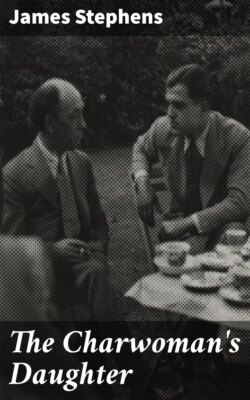Читать книгу The Charwoman's Daughter - James Stephens - Страница 6
На сайте Литреса книга снята с продажи.
III
ОглавлениеTable of Contents
Her mother spoke sometimes of matrimony as a thing remote but very certain: the remoteness of this adventure rather shocked Mary Makebelieve; she knew that a girl had to get married, that a strange, beautiful man would come from somewhere looking for a wife, and would retire again with his bride to that Somewhere which is the country of Romance. At times (and she could easily picture it) he rode in armour on a great bay horse, the plume of his helmet trailing among the high leaves of the forest. Or he came standing on the prow of a swift ship with the sunlight blazing back from his golden armour. Or on a grassy plain, fleet as the wind, he came running, leaping, laughing.
When the subject of matrimony was under discussion her mother planned minutely the person of the groom, his vast accomplishments, and yet vaster wealth, the magnificence of his person, and the love in which he was held by rich and poor alike. She also discussed, down to the smallest detail, the elaborate trousseau she would provide for her daughter, the extravagant presents the bridegroom would make to his bride and her maids, and those, yet more costly, which the bridegroom's family would send to the newly-married pair. All these wonders could only concentrate in the person of a lord. Mary Makebelieve's questions as to the status and appurtenances of a lord were searching and minute; her mother's rejoinders were equally elaborate and particular.
At his birth a lord is cradled in silver; at his death he is laid in a golden casket, an oaken coffin, and a leaden outer coffin, until, finally, a massy stone sarcophagus shrouds his remains for ever. His life is a whirl of gaiety and freedom. Around his castle there spread miles upon miles of sunny grass lands and ripened orchards and waving forests, and through these he hunts with his laughing companions or walks gently with his lady. He has servants by the thousand, each anxious to die for him, and his wealth, prodigious beyond the computation of avarice, is stored in underground chambers, whose low, tortuous passages lead to labyrinths of vaults massy and impregnable.
Mary Makebelieve would have loved to wed a lord. If a lord had come to her when she paced softly through a forest, or stood alone on the seashore, or crouched among the long grass of a windy plain, she would have placed her hands in his and followed him and loved him truly for ever. But she did not believe that these things happened nowadays, nor did her mother. Nowadays! her mother looked on these paltry times with an eye whose scorn was complicated by fury. Mean, ugly days! mean, ugly lives! and mean, ugly people! said her mother, that's all one can get nowadays; and then she spoke of the people whose houses she washed out and whose staircases she scrubbed down, and her old-ivory face flamed from her black hair, and her deep, dark eyes whirled and became hard and motionless as points of jet, and her hands jumped alternately into knuckles and claws.
But it became increasingly evident to Mary Makebelieve that marriage was not a story but a fact, and, somehow, the romance of it did not drift away, although the very house wherein she lived was infested by these conjoints, and the streets wherein she walked were crowded with undistinguished couples...Those grey--lived, dreary--natured people had a spark of fire smouldering somewhere in their poor economy. Six feet deep is scarcely deep enough to bury romance, and until that depth of clay has clogged our bones the fire can still smoulder and be fanned, and, perhaps, blaze up and flare across a county or a country to warm the cold hands of many a shrivelled person.
How did all these people come together? She did not yet understand the basic necessity that drives the male to the female. Sex was not yet to her a physiological distinction, it was only a differentiation of clothing, a matter of whiskers and no whiskers: but she had begun to take a new and peculiar interest in men. One of these hurrying or loitering strangers might be the husband whom fate had ordained for her. She would scarcely have been surprised if one of the men who looked at her casually in the street had suddenly halted and asked her to marry him. It came on her with something like assurance that that was the only business these men were there for; she could not discover any other reason or excuse for their existence, and if some man had been thus adventurous Mary Make-believe would have been sadly perplexed to find an answer: she might, indeed, have replied, "Yes, thank you, sir," for when a man asks one to do a thing for him one does it gladly. There was an attraction about young men which she could not understand, something peculiarly dear and magnetic; she would have liked to shake hands with one to see how different he felt from a girl. They would, probably, shake hands quite hard and then hit one. She fancied she would not mind being hit by a man, and then, watching the vigour of their movements, she thought they could hit very hard, but still there was a terrible attraction about the idea of being hit by a man. She asked her mother (with apparent irrelevance), had a man ever struck her? Her mother was silent for a few moments, and then burst into so violent a passion of weeping that Mary Makebelieve was frightened. She rushed into her mother's arms, and was rocked fiercely against a heart almost bursting with bitter pride and recollection. But her mother did not then, nor did she ever afterwards, answer Mary Make-believe's question.
